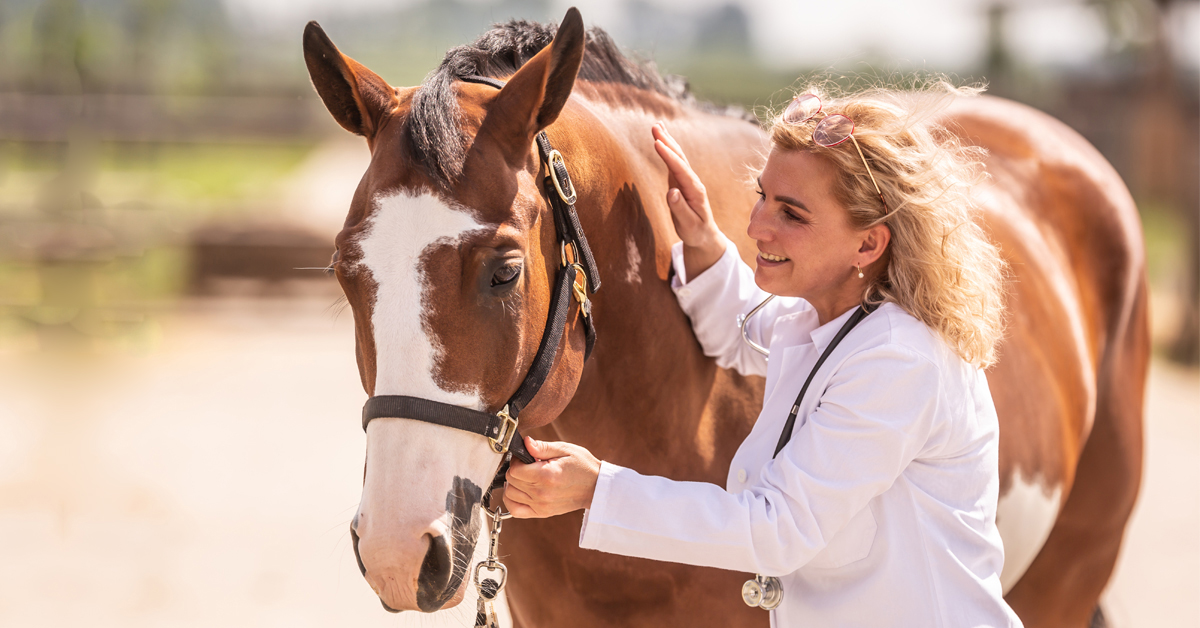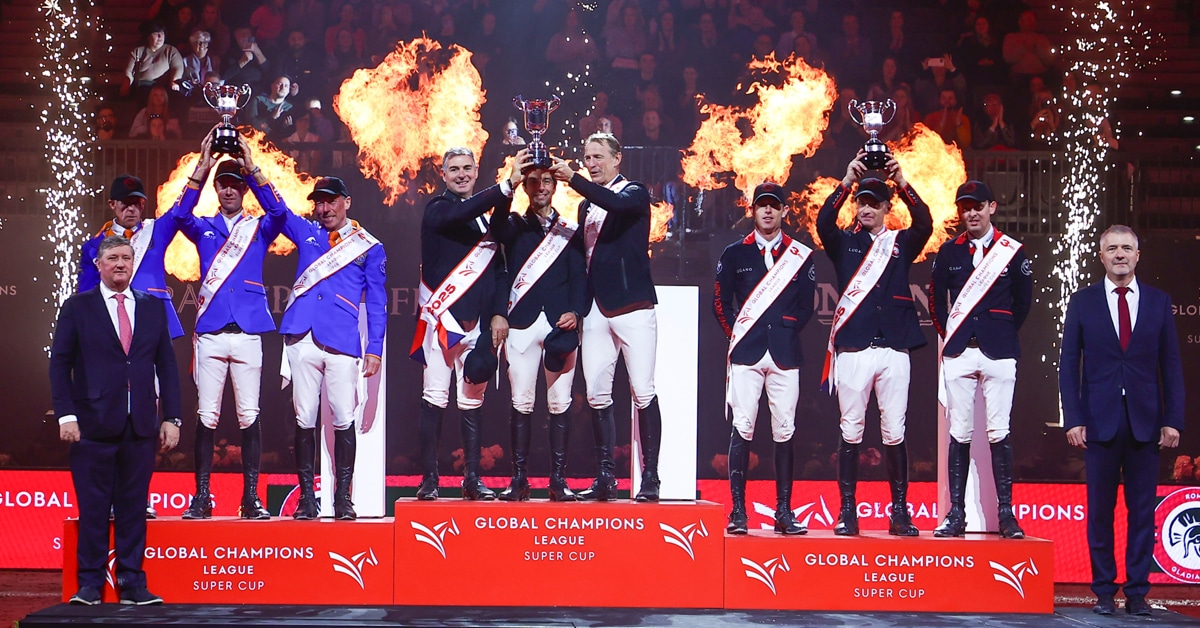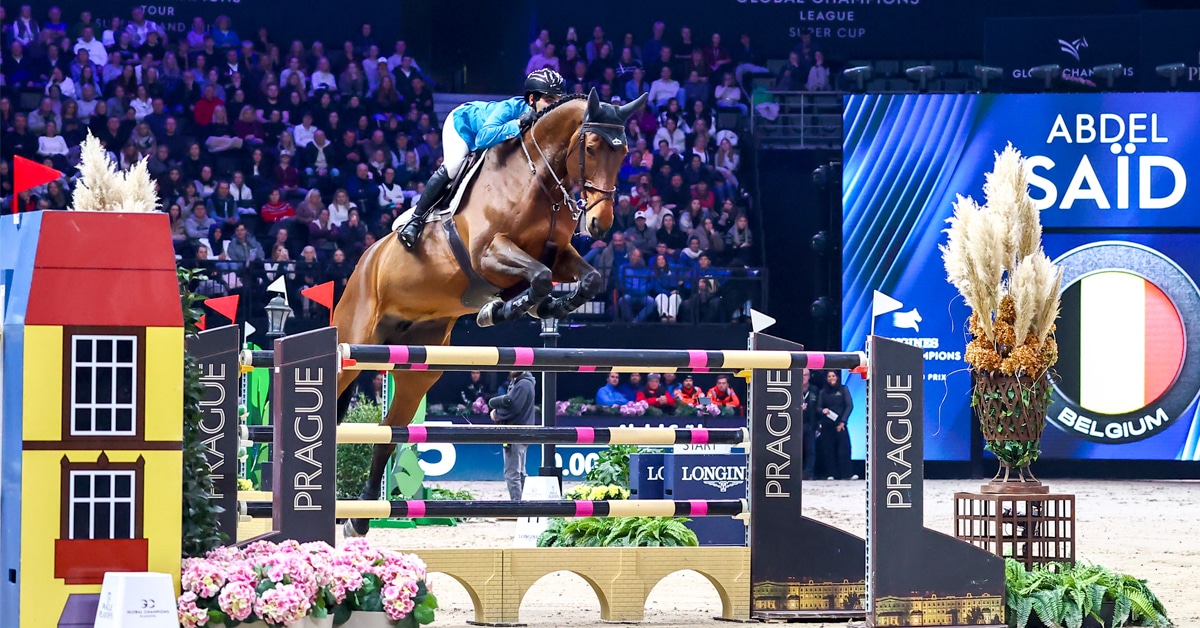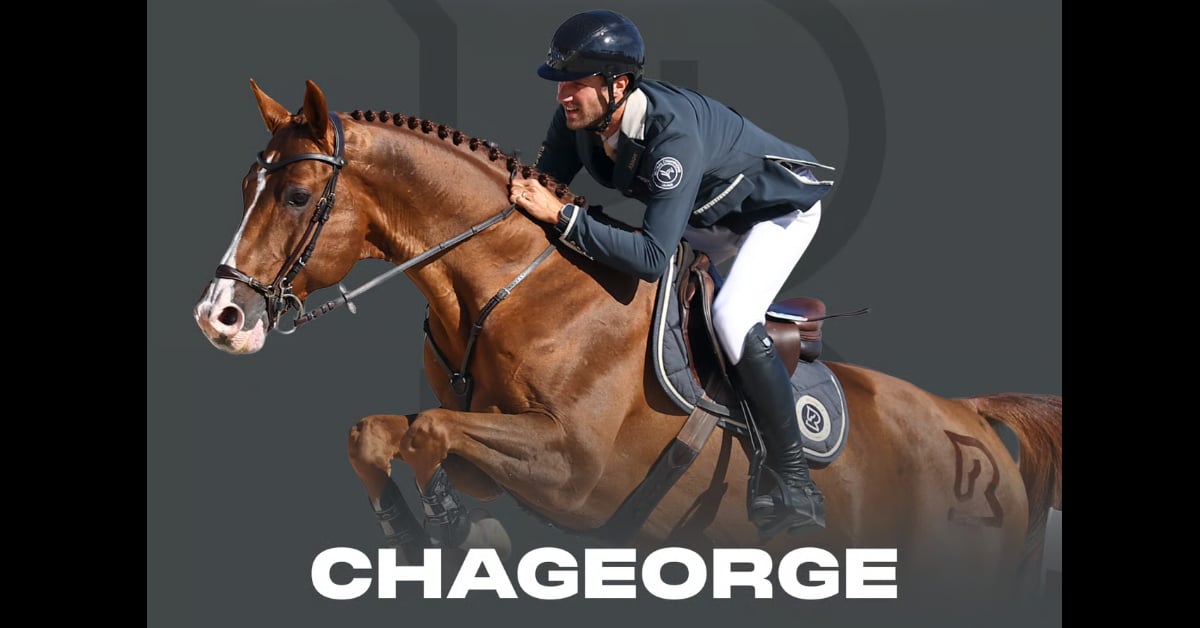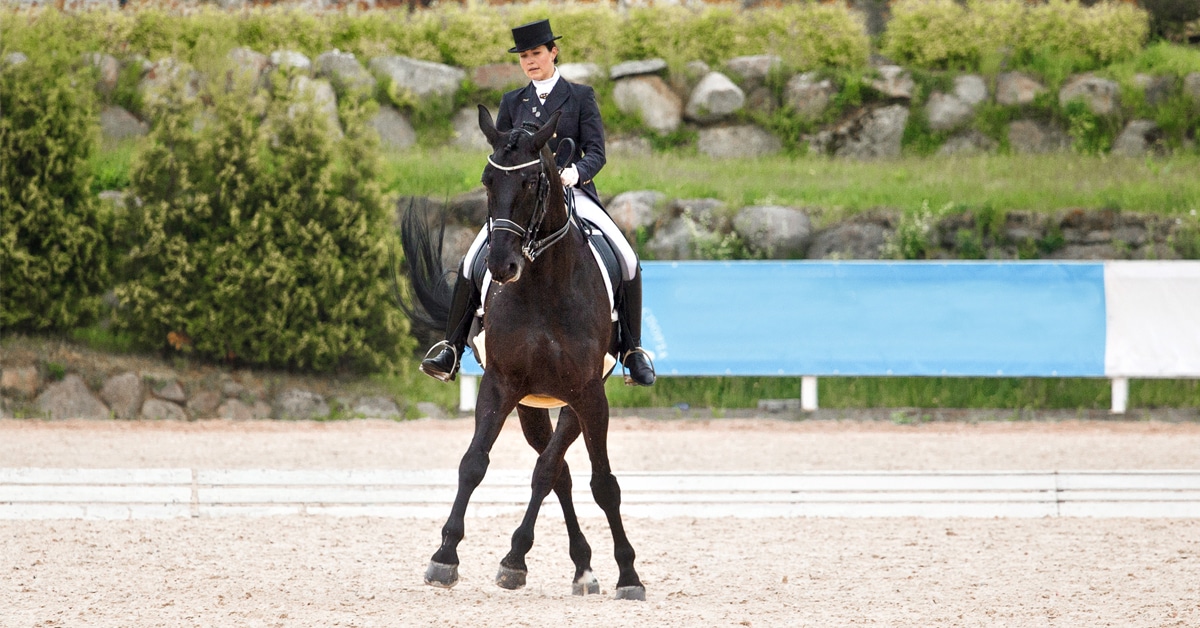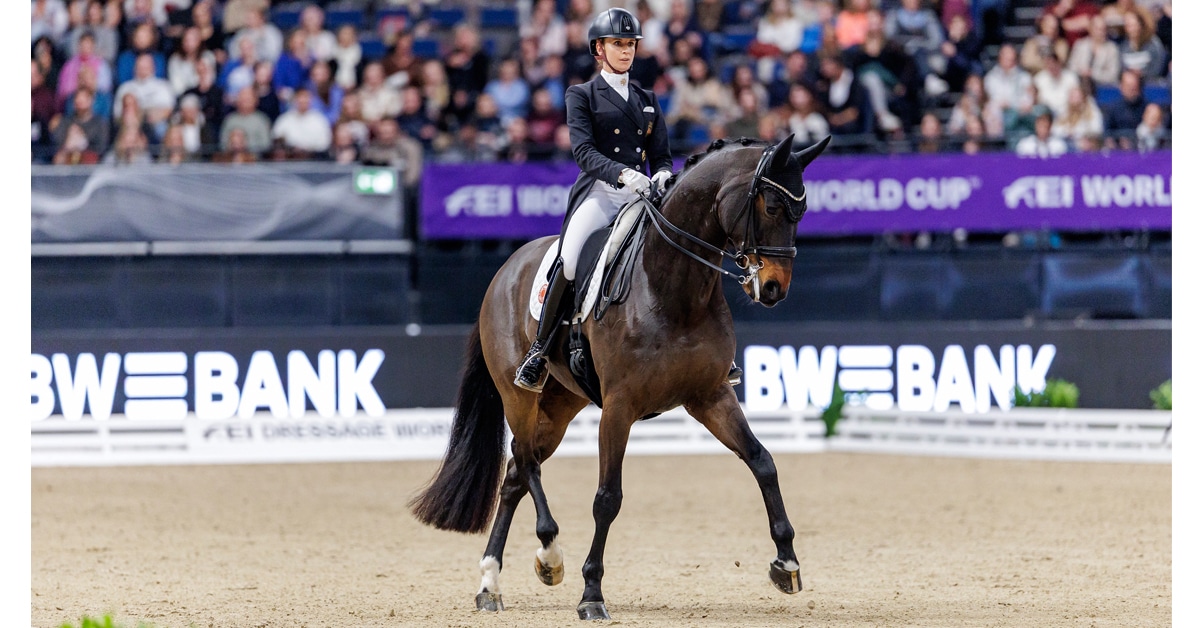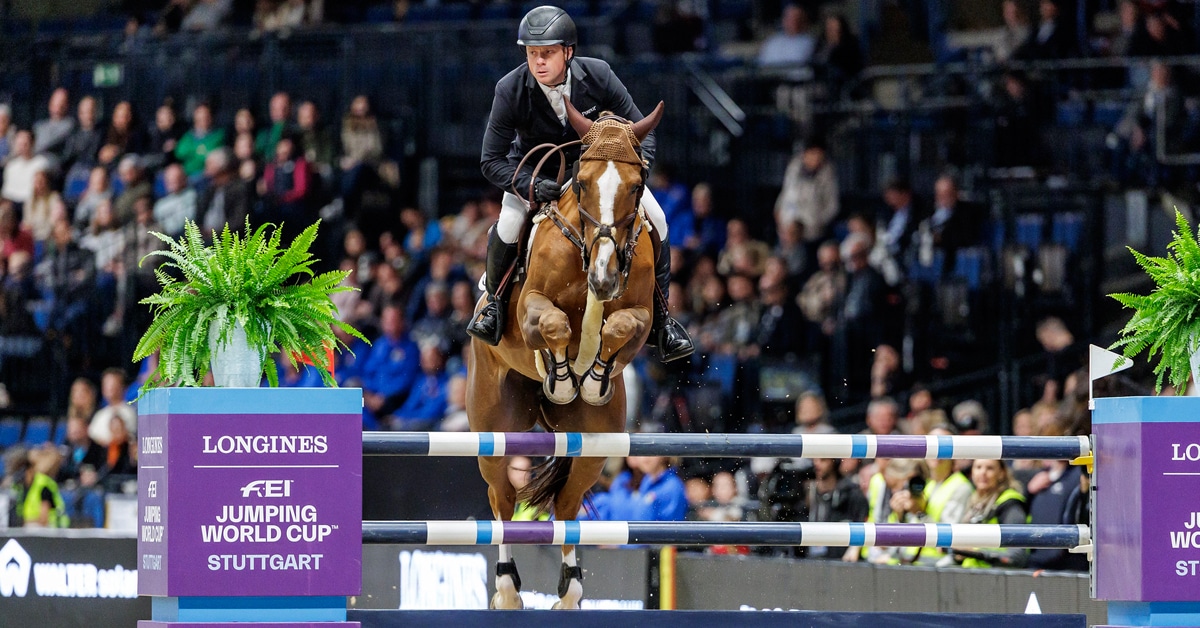Olympic show jumping started under a blistering sun at the Parc de Versailles with 20 teams of three. Canada’s team finished 14th and did not qualify for tomorrow’s team final, although all riders are eligible to compete again in the individual final on August 5th if they pass re-inspection.

Mario Deslauriers and Emerson were the trailblazers for Canada, incurring 12 faults. (Cara Grimshaw photo)
First to go for Canada was Mario Deslauriers on Emerson, the same combination that were part of Canada’s bronze medal effort at the Pan Am Games last year in Chile. The day did not go as planned, however, and the pair incurred 12 faults.
“I think my round in general was pretty good,” said Deslauriers after. “I think riding-wise, I got to the right places. At the first vertical I had down, I think he just needed to jump a little higher. It was, you know, a cheap rail, we shouldn’t have had that. The water was a bit far off, and the pink plank anybody can have it down, if you breathe on it. They have to make a good jump. I came in well, and it was basically up to him a little bit to help me out and maybe he didn’t try hard enough.”
Second to go for Canada was Erynn Ballard making her Olympic debut on Nikka VD Bisschop. The pair had a rail at the jump following the water to earn four faults in an otherwise great trip.
“This is a brand-new partnership, and what an animal to just go out there and believe in me and everything that I’m telling her to do,” explained Ballard. “She for sure jumped the water too high. I’ve never jumped the water on sand before and I think that actually she jumped higher on sand than she did in Spruce Meadows on the grass. She lost her balance a little when she landed; I lost my balance. So I had to compromise five or six [strides]. As a rider, you’ve got to do that in the moment ‒ five disappeared, six was my only option.

Amy Millar’s mount, Truman, had an uncharacteristic 16 faults. (Cara Grimshaw photo)
“This is my fifth metre-sixty class on her,” said Ballard about the still-new partnership with the mare owned by Tara Dow-Rein and the Rein Family that she has only been competing since April. “Out there, we’re doing things together that we’ve never seen together before. She has seen them, and I’ve seen them, but this is a brand-new partnership.”
In her first time in an Olympic arena, Ballard took time to savour the moment.
“I walk in and on all of my horses, I always stop to pet them. And it’s like a moment where I say thank you and good luck. And I also took a moment for myself and I stood there; they hadn’t given me the bell and I just looked around. And I was like, ‘holy cow, this is amazing. This is what we’ve what we’ve been waiting for our whole lives.’”

Laura Kraut of the USA had the fastest clear round of the day riding Baloutinue. (US Jumping photo)
When Canada’s final rider, Amy Millar and Truman, entered the ring, they could afford just a single rail for Canada to qualify as one of the top 10 teams to continue to the Team Final. It was not to be, as the pair had an uncharacteristic 16-fault round which ended the team’s journey.
“I started off and Truman was just feeling a little bit slow today and I kind of knew it in the warm-up,” said a disappointed Millar. “I thought I had him where I wanted him, and he was just a little bit slow. He went in there and he jumped one, two really slow and high and I thought, ‘I gotta get you going.’ And then when I went to move him up in that six strides to the combination, I mean, I got there in six, but he was just flat. So really, it’s about balance with that horse and I know him so well. And when he’s up in the bridle, he jumps unbelievable. I just couldn’t quite get that balance today.”
The pair weren’t the only ones with a disappointing day. The fourth-ranked rider in the world, Steve Guerdat and Dynamix de Belheme, had eight faults, while teammates Pius Schwizer on Vancouver De Lanlore had 12 faults and Martin Fuchs on Leone JEI had four faults. The Swiss had been highly touted to win a team medal at these Games, so it was a surprise that they finished the day in 12th and do not move on to the final.

Ben Maher had a clear round for Team GBR with Dallas Vegas Batilly. (Cara Grimshaw photo)
“Yeah, it was a very bad round,” said Guerdat after his ride. “The result was bad, obviously, but the round was bad. So, it feels very bad right now, but you have to find solutions for why it’s been like this. The round didn’t feel good at all, and that’s very rare with that mare. I think it’s the worst round we’ve had in our career.”
The other surprise of the day was the elimination of the Brazilian team. After his round, blood was found on the flank of Pedro Veniss’s horse Nimrod de Muze and as substitutions are only allowed up to two hours before competition, the team was eliminated.
There were some great highs on the day, however, including Karl Cook who was substituted in this morning after Kent Farrington’s horse Greya had an allergy-related issue. On his Olympic debut, Cook delivered a clear round on his horse Caracole de la Roque.
“I feel proud that I could do that for team USA,” said Cook, adding that the experience prompted many emotions. “It was great. I think when you’re doing it, it feels a different way than when you finish. It’s relief, joy, happiness. You feel proud.”

Philipp Weishaupt and Zineday had one of the German team’s three clear rounds. (Cara Grimshaw photo)
Similarly, Germany’s Richard Vogel, ranked 10th in the world, was also making his Olympic debut on United Touch S and delivered a clear round for his team.
“It was a super feeling. I couldn’t wish for a better Olympic debut, I think. In front of such a stage, such a crowd, I think we couldn’t have wished for a better venue and also for a better start.”
The German team finished on top with no faults, followed by the US with a score of six and Great Britain with a score of eight, but with the fastest cumulative time to edge out Belgium and the Netherlands. The Final, however, starts with a blank slate and all scores go back to zero. The team score will be calculated by adding the penalties and time for all three combinations, but if there is a tie for first place based on penalties, the two teams will jump off.
Canada’s chef d’équipe, Ian Millar, was disappointed but pragmatic.
“Two words that don’t go together are sport and excuses – so that’s not what I’m going to do,” he said. “I’m just going to say that we have four extraordinary horses and four extraordinary riders here and it was not their day. And if you look at their record, I mean they do fantastic on a regular basis and today it didn’t work. But no excuses.”
All riders are eligible to continue into the individual competition on August 5th and substitutions are permitted if a horse or rider are medically unfit to continue.
Canada’s reserve rider is Tiffany Foster who is Canada’s top-ranked rider and is also the leading female rider in the world in 19th. Millar will consider whether to bring them in for the individual competition.
“We’ll see how the horses are tomorrow,” said Millar, “to see whether there was any reason why Emerson and Truman behaved so uncharacteristically.”
Millar explained that Foster wasn’t named to the team because Figor had not competed since the Pan Am Games, so his form could not be assessed prior to when the team had to be named.
“Myself and my committee had not seen the horse compete in an FEI class prior to when we had to name the team,” explained Millar. “So we were in quite an awkward position. And so we named her with Battlecry, and she was quite pleased to be the reserve with Battlecry. She would not have wanted to be one of the riders on the team with Battlecry; he’s a wonderful horse, he’s just not ready. Since then, Figor really came online and the substitution rules allowed us to make the change.”
Team competition continues tomorrow at 2:00 pm local time with the top 10 teams: Germany, United States, Great Britain, Belgium, Netherlands, Ireland, France, Sweden, Israel, and Mexico.
Results here.
More News
